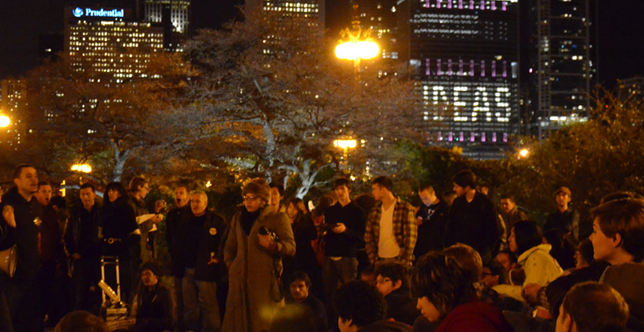Building a better future (despite the 1%)

When I was in New York recently I didn’t attend the Occupy Wall Street demonstrations. Whilst I respect the ideas behind the movement, I’m just not sure it’s achieving anything. The protest inspired by #occupyws in my nearest city of Newcastle is certainly a bit forlorn and is gently ridiculed by the media. What’s far more effective, I think, is to infiltrate and convert the mass media to the cause. Not only does this mean a much wider representation of the ideas behind what’s going on, but (hopefully) retains the purity of the message.
I can’t claim to have read widely on the literature around #occupy and their message that it’s the 1% of the population that are screwing it up for everyone else but this article in the Guardian by George Monbiot certainly includes a few home truths. Here are what I consider to be the highlights (my emphases):
If wealth was the inevitable result of hard work and enterprise, every woman in Africa would be a millionaire. The claims that the ultra-rich 1% make for themselves – that they are possessed of unique intelligence or creativity or drive – are examples of the self-attribution fallacy. This means crediting yourself with outcomes for which you weren’t responsible. Many of those who are rich today got there because they were able to capture certain jobs. This capture owes less to talent and intelligence than to a combination of the rutheless exploitation of others and accidents of birth, as such jobs are taken disproportionately by people born in certain places and into certain classes.
In their book Snakes in Suits, Paul Babiak and Robert Hare point out that as the old corporate bureaucracies have been replaced by flexible, ever-changing structures, and as team players are deemed less valuable than competitive risk-takers, psychopathic traits are more likely to be selected and rewarded. Reading their work, it seems to me that if you have psychopathic tendencies and are born to a poor family, you’re likely to go to prison. If you have psychopathic tendencies and are born to a rich family, you’re likely to go to business school.
Chief executives now behave like dukes, extracting from their financial estates sums out of all proportion to the work they do or the value they generate, sums that sometimes exhaust the businesses they parasitise. They are no more deserving of the share of wealth they’ve captured than oil sheikhs.
…
Now they have almost bankrupted us. The wealth creators of neoliberal mythology are some of the most effective wealth destroyers the world has ever seen.
Whilst I agree with most of the ideas behind the above, one thing (perhaps because of space) that Monbiot doesn’t mention is that, financially, we in the west are pretty much all in the top 5% of the world’s richest people. I turn on a tap and water comes out. If I’m cold I turn up the heating. I can send my children to school for free. I don’t worry each day about violence to my family. I live in a democracy.
The trouble with messages such as ‘we are the 99%’ is that there exists huge disparity and diversity even within that figure. It comes across as mass individualistic protesting, with focus and definition provided by grouping around negative slogans rather than positive action. Whilst the 1% should be questioned and challenged, we all need to be doing more to create a fairer, more equitable society. Let’s not get carried away by political reductionism and slogans. We can do better than that. It’s trivially easy to retweet something or join a Facebook group, but what are we (myself included) actually doing over and above this to make this world a better place? I can’t help but think that marching and camping out isn’t enough any more. What (and where) are we building?
Image CC BY-NC Occupy Global

I think that the major difference between me and the 1% is that if they disagree with the government they can simply buy a member of Parliament or congressman, and if I disagree with government, I cannot.
And while calling me one of the 5% may sound like a good way to reallocate blame, or at least redistribute it, it does not change this basic fact.
Well, that’s one example, certainly. I agree with the sentiment, I just think it’s a bit more nuanced than the binary opposition currently being presented.